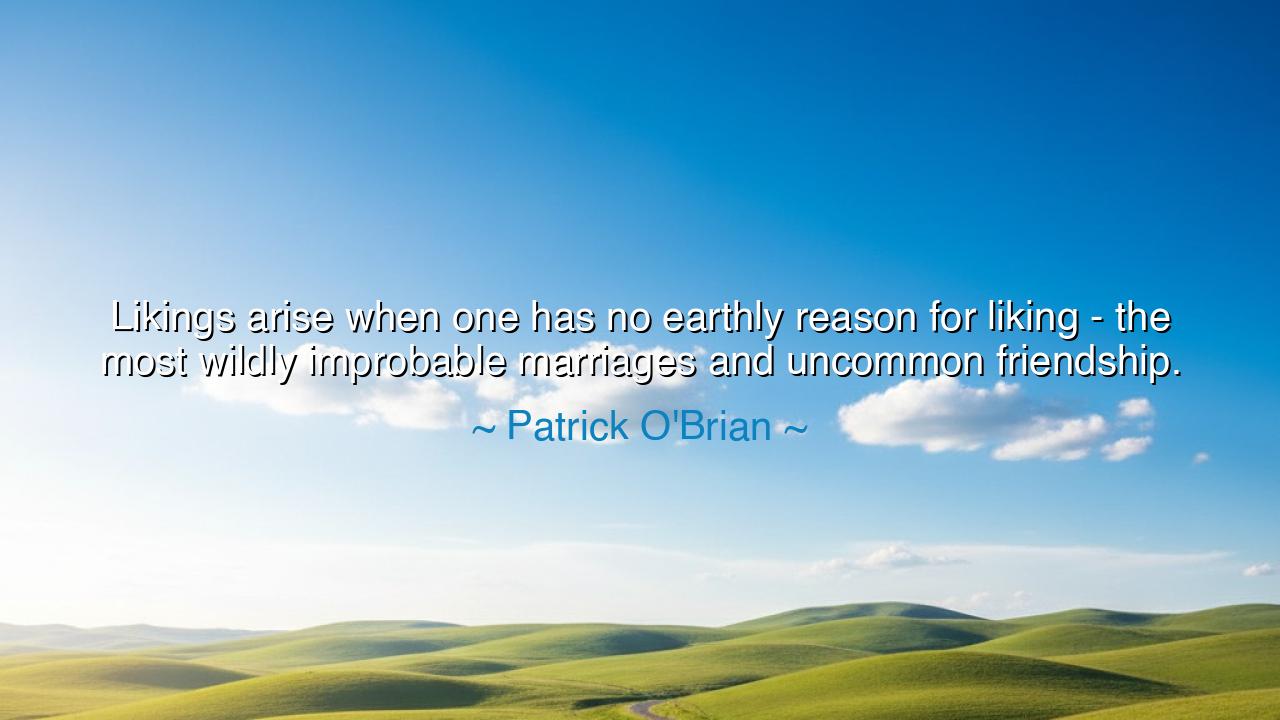
Likings arise when one has no earthly reason for liking - the
Likings arise when one has no earthly reason for liking - the most wildly improbable marriages and uncommon friendship.






“Likings arise when one has no earthly reason for liking — the most wildly improbable marriages and uncommon friendship.” — in these words, Patrick O’Brian, the master of historical storytelling, captures one of the most wondrous mysteries of the human heart. His reflection speaks to the unseen alchemy that binds souls together — a force beyond logic or circumstance, beyond station or similarity. It is as if he reminds us that affection, whether born of love or friendship, does not always obey the rules of reason, but instead answers to a deeper calling — the whisper of spirit to spirit, which no world of reason can explain.
In the age of the ancients, the philosophers sought to classify all things, even the movements of the heart. They spoke of love that is rational, founded on likeness or advantage; and they spoke, too, of love that is divine — springing up unbidden, as if heaven itself had placed one soul beside another. O’Brian’s wisdom belongs to this second kind. He tells us that the most improbable unions, the friendships that defy all expectation, are often those most real and enduring. For reason may measure advantage, but only mystery can measure connection.
One finds this truth in the most unlikely corners of history. Consider the friendship between Marcus Aurelius, the philosopher-emperor of Rome, and his general Lucius Verus — two men utterly different in nature. Marcus, disciplined and contemplative; Verus, wild, indulgent, and free-spirited. Yet bound together by fate, they ruled an empire in uneasy harmony, and their affection survived their contrasts. The stoic sage and the pleasure-seeker found common ground not through logic, but through loyalty — a bond so deep that even the chronicles of power could not obscure it. Their story stands as a testament to O’Brian’s truth: that friendship often blooms where the soil seems barren, and understanding arises where none should be possible.
So it is also with love — those “wildly improbable marriages” that defy the wisdom of society and yet endure the tests of time. History tells of Abigail and John Adams, two souls who, though separated often by duty and distance, shared a unity that transcended every boundary. She, a farmer’s daughter; he, a lawyer turned revolutionary. By the world’s standard, their paths should have diverged — yet they wrote to each other as equals in mind and heart, their letters glowing with humor, trust, and devotion. Theirs was not a match of convenience but of destiny, the meeting of two spirits who recognized in each other something eternal.
The origin of O’Brian’s quote lies in the heart of his literary world — a world of sailors, scholars, and adventurers. He saw, in the friendship between his famed characters Captain Jack Aubrey and Dr. Stephen Maturin, this very paradox: men of utterly different tempers — one blunt and vigorous, the other intellectual and secretive — yet drawn together by respect, laughter, and shared peril. They argued, they differed, yet they stood by one another in the face of storm and war. It is this “uncommon friendship” that reveals the beauty of life’s contradictions — that two who should never meet may become, in truth, inseparable.
This mystery is not confined to great men, nor to stories. It dwells in every human life. How often have we met a person so unlike ourselves — by age, belief, or temperament — and yet felt a strange kinship, a recognition without cause? Such moments are not accidents. They are the subtle workings of something divine, the proof that beneath the masks of difference, all souls speak the same silent language. When O’Brian says that “likings arise when one has no earthly reason,” he points to this miracle — that the heart knows long before the mind can explain.
Therefore, let all who hear these words remember: do not measure friendship or love by reason alone. Do not ask whether a bond is “sensible,” or whether it fits the mold the world prescribes. The truest connections in life are not planned; they are discovered — found in laughter shared by chance, in loyalty proven through trial, in the quiet joy of being known. Be open to the improbable, for it is often there that the divine hides its greatest gifts.
For what is life without such miracles of connection? The mind may build walls, but the heart builds bridges that no logic can dismantle. Cherish the friendships that surprise you, the loves that defy your understanding. In them you will find what the wise have long known: that though reason rules the world, it is affection, unreasoning and unearned, that gives it meaning. And so it is, as O’Brian wrote, that “likings arise when one has no earthly reason for liking” — for heaven, not earth, is where the deepest bonds are forged.






AAdministratorAdministrator
Welcome, honored guests. Please leave a comment, we will respond soon